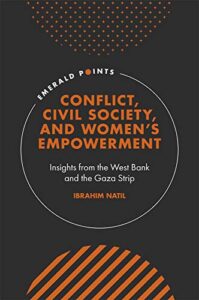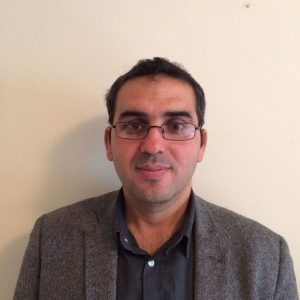Ibrahim Natil
Covid-19, violence, and the Israeli foreign occupation impose new challenges and serious barriers to effective engagement and community participation in the Occupied Palestinian Territory.
The Women’s International League for Peace and Freedom (2020) and the UN Commission on the Status of Women (2019) have expressed concern about the high rates of poverty and unemployment (2019) and Israel’s illegal practices of ‘home demolitions, evictions of Palestinians, the revocation of residency rights, and arbitrary detention and imprisonment’ as part of the systematic violation of human rights. According to PCBS, 3 women were killed by the Israeli forces, 128 women were arrested in the West Bank, Jerusalem and the Gaza Strip, and there are 40 women were still in Israeli prisons as of the end of 2020.
The monthly average of Palestinian structures targeted by Israel has increased by 65 per cent this year compared to 2020. This environment of escalated violence from time to time has already made grassroots participation and empowerment activities impossible as the local organisations need time to assist women and their families to recover from, and accommodate each cycle of violence.
Domestic Violence
Domestic violence against women has increased since the beginning of 2020. Even before Covid-19, the rate of violence against women was high. Women account for roughly 50.2 per cent of the total Covid-19 infections in Palestine, and a majority of them live in the most vulnerable and marginalised areas of the Gaza Strip and the West Bank. Palestinian society generally restricts women to household work and raising children. There are some groups, including women, who believe that the proper place for women is in the house–cleaning, taking care of children and preparing food. According to PCBS, the majority of men believe that women are not able to deliver and contribute to social development policies and society’s political process. The percentage of households headed by women in Palestine in 2020 was 11% (12% in the West Bank and 9% in Gaza Strip), owing to the absence of the husband as a result of death and political prison in Israel.
There are young leaders and local civil society organisations (CSOs) who have attempted to change the circumstances and constraints that have placed women in difficult situations. For example, a Gaza-based organisation, Society Voice Foundation (SVF), has recently launched a project to empower women’s engagement in fighting domestic violence. Palestinian CSOs have long experience of adapting the scope of their work and activities to societal, political and economic shifts.
Economic Pressure
The economic, social and/or political situation of women has not changed during the pandemic; there is still a gap in the participation rate and average daily wages of men and women. However, some women still seek to play a role in the market–fighting poverty, inheritance deprivation, domestic violence and unemployment. Women experience a high rate of poverty owing to the already poor economic circumstances in the Gaza Strip (UNOCHA, 2020). The female participation rate in the labour force decreased to 16% in 2020 (down from 18% in 2019), as a result of the lockdown measures implemented following the pandemic. For comparison, the rate of male’s participation in the labour force was 65% in 2020, down from 70% in 2019. (PCBS, 2021, March 7)
Women continue to fight to improve their position and move from the margins of society to become key decision-makers in civil, economic, political and community work. Despite this, merely 5% of the Palestinian Central Council members, 11% of the Palestinian National Council members and 13% of the Council of Ministers members are women. 11% of ambassadors in the Diplomatic Service are women. Moreover, there is only one woman who holds the position of a governor (out of 16 governors). Women’s participation in the civil sector stands at 45% of the total employees, but when looking at those who hold the rank of Director General and higher, we see the gap reflected with just 14% of women at this level.
 These circumstances have made Palestinian women suffer from a high level of violence, poverty, lack of opportunities and absence of hope. These impacts are further implied in contexts of fragility, conflict, refuge, displacement and emergencies where social cohesion is already undermined and institutional capacity and services are limited (Care International, 2020). These circumstances also impose huge challenges and restrictions on women and their socio-political engagement, economic development and activism. Even while Palestinian CSOs face major hurdles during the pandemic as a result of successive crises striking the Palestinian society, they have continued their operations to assist women’s empowerment, and address economic deprivation and political deadlock. I discuss these serious challenges and how they are met by the resilient women of Palestine, in my book Conflict, Civil Society, and Women’s Empowerment: Insights from the West Bank and the Gaza Strip.
These circumstances have made Palestinian women suffer from a high level of violence, poverty, lack of opportunities and absence of hope. These impacts are further implied in contexts of fragility, conflict, refuge, displacement and emergencies where social cohesion is already undermined and institutional capacity and services are limited (Care International, 2020). These circumstances also impose huge challenges and restrictions on women and their socio-political engagement, economic development and activism. Even while Palestinian CSOs face major hurdles during the pandemic as a result of successive crises striking the Palestinian society, they have continued their operations to assist women’s empowerment, and address economic deprivation and political deadlock. I discuss these serious challenges and how they are met by the resilient women of Palestine, in my book Conflict, Civil Society, and Women’s Empowerment: Insights from the West Bank and the Gaza Strip.
 Dr Ibrahim Natil is a Research Fellow at the Institute for International Conflict Resolution at Dublin City University. He is the Co-convenor of NGOs in Development Study Group, DSA-UK. He is also the winner of Robert Chamber Best Overall Paper, selected by DSA Ireland (2017). He is the author and editor of a number of books.
Dr Ibrahim Natil is a Research Fellow at the Institute for International Conflict Resolution at Dublin City University. He is the Co-convenor of NGOs in Development Study Group, DSA-UK. He is also the winner of Robert Chamber Best Overall Paper, selected by DSA Ireland (2017). He is the author and editor of a number of books.


